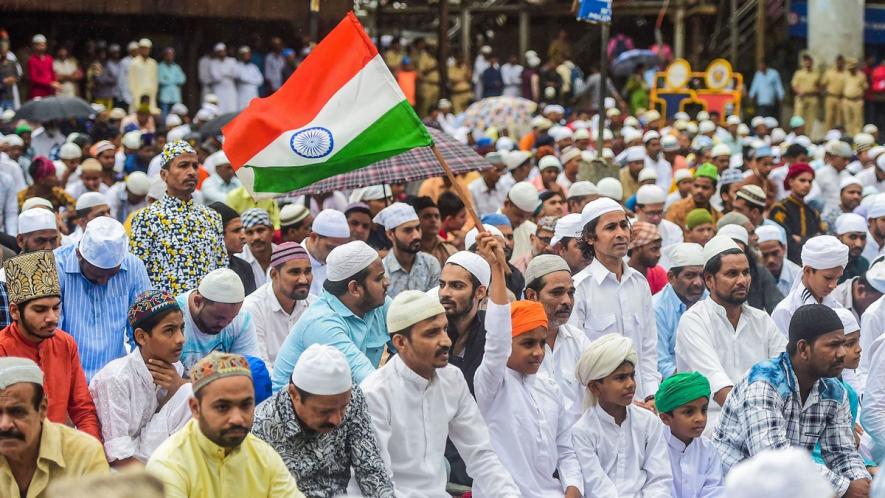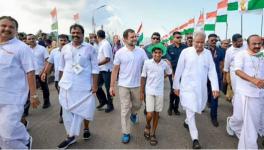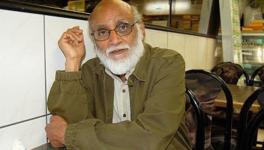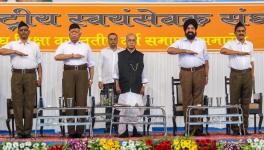Is Lack of Leadership why Indian Muslims are Falling Behind?

Representational Image.
Indian Muslims face a double whammy of acute repression at the hands of the state and lack of leaders who can effectively present their point of view. The community feels boxed in and fearful of the future because new forms of subjugation—mob lynching, vilification by media, denigration in the garb of fighting a pandemic, multiple let-downs even in the law courts—are being normalised.
To be fair, things were never rosy for Indian Muslims, particularly after the demolition of the Babri masjid. But of late they have had to confront even the possibility of disenfranchisement through the CAA-NPR-NRC triad. Naturally, the circumstances have given fresh momentum to the talk about Muslim leadership. But is a new crop of Muslim leaders what the community desires and needs? And who could be such a leader?
After Independence, religious leaders and Islamist organisations flourished among Indian Muslims. This happened largely because the middle and upper strata of the community migrated to a newly-formed Pakistan, while the mostly uneducated and poor Muslims stayed behind. It is no surprise that religiosity thrived among them, as it does in any vulnerable section. However, this caused havoc within the community, as the religious leadership had no understanding of how to manoeuvre the community towards prosperity and development.
The ascendency of religious leadership made the lack of socio-political leadership even more sharply evident to Muslims. Ali Nadeem Rezavi, who teaches history at Aligarh Muslim University, tells me, “There is no Muslim leadership in India today, never has been, nor is it needed if we consider India a democracy. We never talk of a ‘Hindu’ leadership, then why a separate one for the Muslims?”
Yet, unfortunately, religious personalities have donned the mantle of “leadership” on behalf of the Muslims—a phenomenon encouraged by communalists in the majority community, says Rezavi, for it proves their point that the Muslims are aloof from the national mainstream. “The ulema have tried to further their own interests, to the detriment of the larger community.” Like any other clergy, those of the Muslims tend to thrive off the ignorance of the laity.
Asad Zaidi, a writer and the founder of Three Essays Collective, a publishing house, says that no inherent inability prevents Muslims from conceiving of a leadership, but there is an “iron-clad consensus across the political and social spectrum”, that they should not have one. Hence if Muslims attempt organising over socio-economic or political issues, it is dubbed as “dangerous and communally explosive”.
The trigger of Partition and the consequent formation of Pakistan is usually blamed for this, but majoritarianism, Zaidi points out, is an older evil than 1947. “Denying ethnic, political or religious minorities space has always been normalised in the subcontinent,” he says. This majoritarian sentiment, he says, “can equally reasonably be seen as having caused the Partition.” He feels that the anti-Muslim consolidation among diverse Hindu populations and other communities, such as the Jains, is key to understand the problem.
The burden of this complex and long history is such that the only “permitted” form of organisation among Indian Muslims is religious or quasi-religious. The leading lights of such organisations are treated by the media and mainstream political outfits as representatives of Muslims on all issues. “It does not help to say that this class of Muslim organisations failed the Muslims—it was designed to fail,” Zaidi says.
Yet Zaidi does not believe that Muslim leadership is fully in the hands of its clergy and therefore responsible for its lagging behind. He believes that the clergy are inherently incapable of leadership, for they lack its core essentials—a mass base, political understanding and even rudimentary acceptance of democratic processes. Nor do most Muslims look up to the clergy for leadership. For all these reasons, it cannot be held responsible for what ails the community. What he means is that the marginalisation of Indian Muslims is not a consequence of their “backwardness” but the other way around—they are neglected and therefore remain backward. “Not just government ‘negligence’, Muslims are victims of targeted structural injustice and violence,” he says.
Broadly speaking, the story of Muslim leadership has gone from Maulana Abul Kalam Azad, the first education minister, to Bukkal Nawab, a Uttar Pradesh politician known mostly for his controversial statements, who left the Samajwadi Party in 2017 and joined the ruling Bharatiya Janata Party. Besides, if political leaders do speak out on behalf of Muslims today, they quickly lose their voice in the face of majoritarian assaults. “The point,” says Zaidi, “is that unlike the Dalits and the backward classes, Muslims have not been allowed to politically articulate their socio-economic, political, even human rights.”
The result—or cause—of Muslim suffering is also their utter lack of effort towards building institutions within the community. There is not a single meaningful civil liberty organisation for the 200 million-strong Muslims of the country. For this reason, the police finds it easy to target Muslim youth without fearing the consequences. People arrested on flimsy grounds—such as the ones being picked up, without any proof, for allegedly orchestrating the February violence in Delhi—end up getting little, if any, substantive support from the community. This lack of sources where one can seek recourse coupled with state-led oppressions negatively impacts the community in the long run.
Mohammad Sajjad, professor of modern Indian history at AMU, says, “Efforts have been made [to set up civil rights organisations] but they are inadequate in quantum, reach and expanse,” he says. “If analysed minutely, they were not prioritised because the community was unable to understand why civil rights bodies are needed,” he says.
Mohammad Reyaz, who teaches journalism at Kolkata’s Aliah University does not believe that the clergy has held back the community. “No leadership should be above criticism, but the religious leadership do much more for the community through charity and other related works than the so-called liberal Muslim leaders who appear disconnected from the masses,” he says. He, too, holds successive governments responsible for the community’s present conditions. “There is government apathy and yes, after Partition, no true leadership could emerge among Muslims. The anti-CAA protests had given hope of some new leaders, but the ruling dispensation appears hell-bent on crushing them,” says Reyaz.
During the struggle for Independence, the tallest leader of subcontinental Muslims was Maulana Azad, a former president of the Indian National Congress and a renowned scholar who batted for a unified India all his life and antagonised many in the process, particularly the zealots who demanded a separate Muslim state.
There was also Maulana Hussain Ahmad Madani, who had admirers across the political and religious spectrum. A Deobandi alim or scholar and also freedom fighter, he fashioned the idea of composite nationalism or “muttahida qaumiyat” for Muslims in the subcontinent. Madani was incarcerated in Malta for three years, along with Maulana Mahmud Hasan, the man behind the Reshmi Rumal Tehrik.
Zakir Husain, the third President of India and founder of Jamia Millia Islamia is another such figure, a nationalist to the core who epitomised everything Gandhian. After he died in May 1969, the last of the last truly national leaders of Muslims was lost. Therefter, the community felt politically and socially orphaned, a feeling that has grown over time. There have been Muslim leaders thereafter, but mostly regional “faces”—or religious figures—and none attained the stature of this trio.
The desire among Indian Muslim, especially those well-educated, is that “the Nadvis, Jamaatis, Bukharis, Firangi mahalis and Jawwads can lead the prayers but they must stop talking politics. Each of them is propertied and rolling in money while the people they are supposed to be leading are literally starving. Their sons and daughters are getting a modern education, while the community they claim to represent is illiterate and steeped in ignorance,” says Rezavi.
So what would someone’s idea of a leadership for the Muslims of today be like? As Rezavi says, “They need a forward-looking secular leadership which can understand the social, economic and political interests and aspirations of the masses.”
The author is a writer and columnist. The views are personal.
Get the latest reports & analysis with people's perspective on Protests, movements & deep analytical videos, discussions of the current affairs in your Telegram app. Subscribe to NewsClick's Telegram channel & get Real-Time updates on stories, as they get published on our website.
























